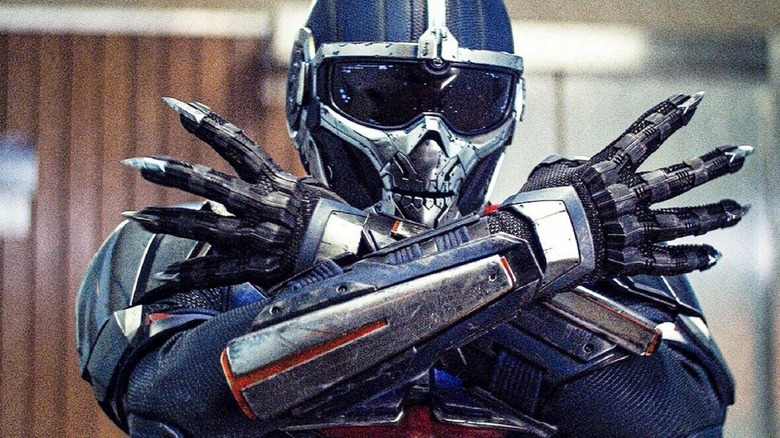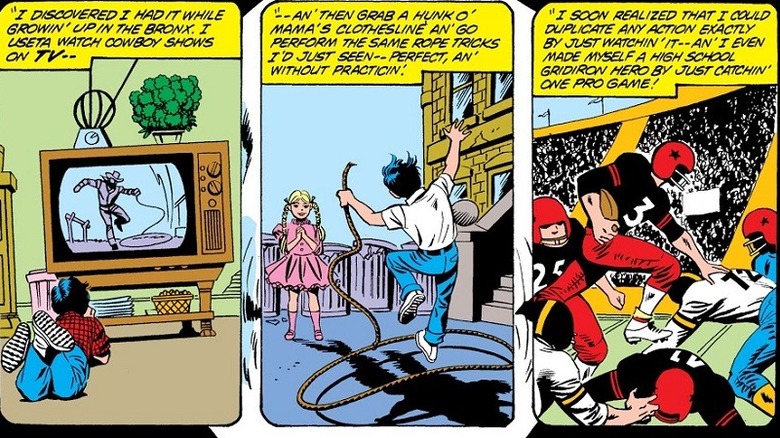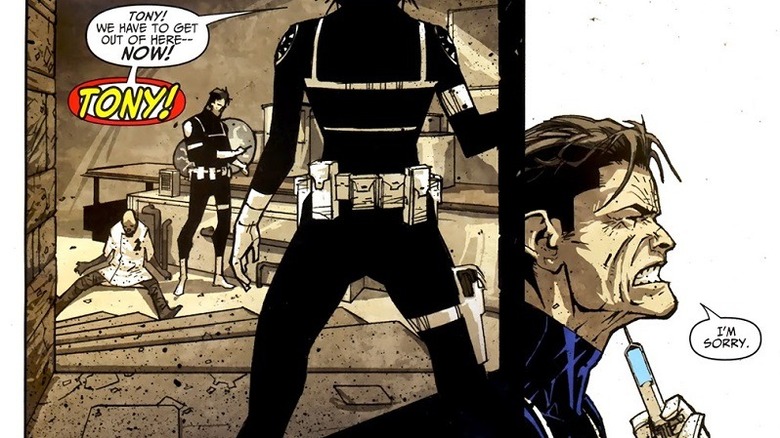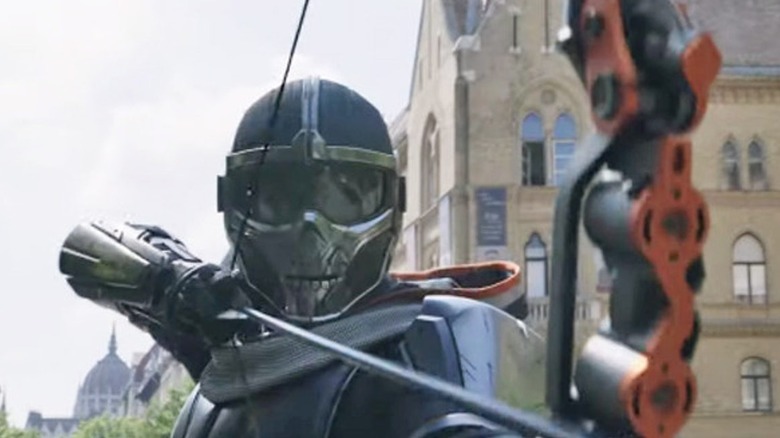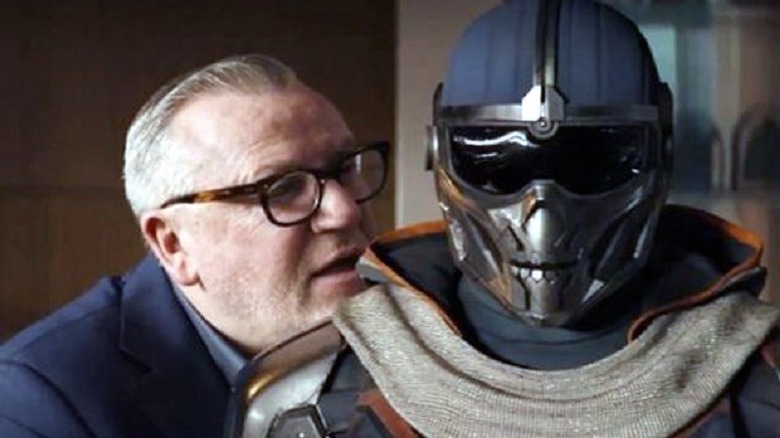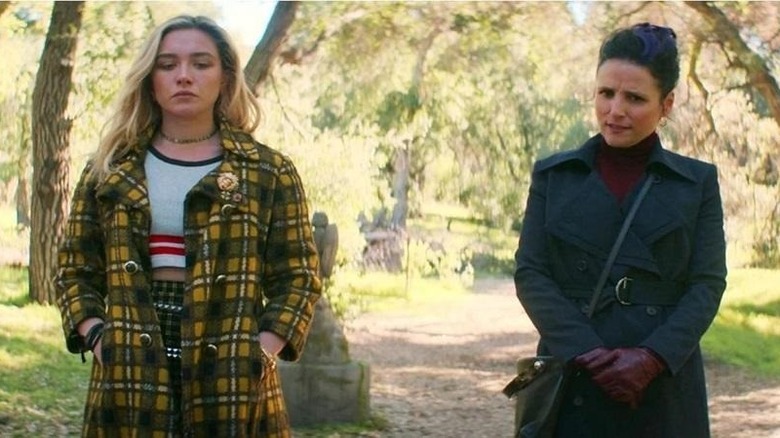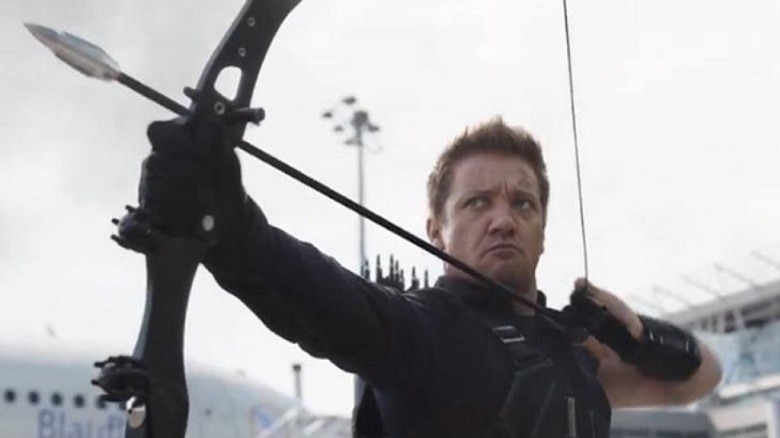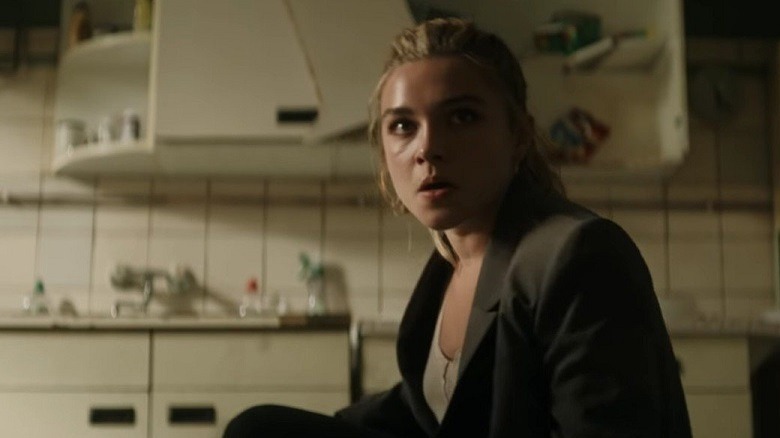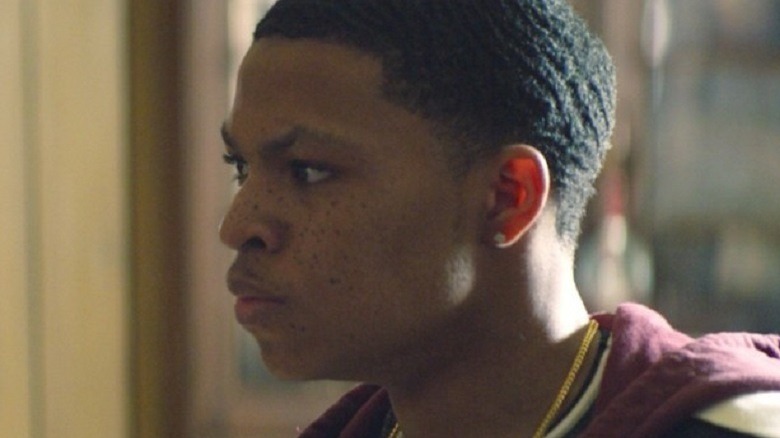Taskmaster's Future In The MCU Explored
The Taskmaster is a formidable opponent for Natasha Romanoff and Yelena Belova in "Black Widow." A deadly assassin with the ability to mimic the movements and fighting ability of any opponent, simply by watching them, is a terrifying prospect — and for most of "Black Widow," this character is even more frightening because of what they don't say. Unlike your average chatty supervillain, the Taskmaster is mute, silently dispatching opponents with a frightening relentlessness. Of course, the complex family dynamics at the core of the movie's emotional narrative extend to the Taskmaster as well, as it's ultimately revealed that underneath that imposing helmet, she's really Antonia Dreykov, the daughter of the true villain of the film. Played by Olga Kurylenko, the character's sheer screen presence, shrouded in mysterious armor and brimming with deadly weapons, makes for a fascinating counterpoint to the quicker Black Widows.
Her inspiration from the comics, Anthony Masters, has a vastly different origin in many respects, but the two characters also retain some crucial similarities — in terms of their powers as well as their respective backgrounds. Given where Antonia winds up at the end of "Black Widow," there are a lot of possibilities ahead of her in the Marvel Cinematic Universe. Let's take a closer look at the history of her inspiration in the comics, her importance in the film, and where she might wind up in future Marvel films and television series.
Taskmaster's first origin
The Taskmaster is unusual for a villain in the Marvel Comics universe because, at least to begin with, he wasn't interested in splashy villainy. He didn't rob banks, he didn't care about ruling the world, and he didn't have blood feuds with superheroes. In fact, fighting superheroes was the last thing he wanted to do. He discovered as a child that he had what he referred to as "photographic reflexes," similar to having a photographic memory. All he had to do was watch someone do something once and he could reproduce it perfectly, with no practice. He thought about being a hero and also thought about being a villain, but both prospects sounded painful to him.
Instead, being the opportunist that he was, he saw a need and decided to fill it. Supervillains need goons to fight superheroes. After all, banks need to be robbed, and any great bad guy has to have a crew of expendable minions to fight annoying heroes so they can go about their days. The question is, where do these goons come from? Who trains them to be competent enough to give heroes a hard time? The Taskmaster made himself the answer to this question by setting up a series of "academies" disguised as prisons or mental institutions that he used to provide complete profiles of potential flunkies and train them how to fight and use weapons. One of them was exposed thanks to an error by an administrator, and the Taskmaster had to fight the Avengers. He held his own against them, but escaped instead of sticking around to see who'd win.
Taskmaster's second origin
Any comics character who sticks around long enough will live to see his or her origin rewritten in some way, and Taskmaster is no different. In the second version of the character's backstory, Tony Masters was an agent of S.H.I.E.L.D. who was on assignment when he came across a dying Nazi scientist who had a variation of the super-soldier serum that would enhance his photographic reflexes even further. Tony injected himself, but the serum had an unfortunate side effect: The skills he attained by watching others started erasing his own long-term memories. When this became evident, he was used as the ultimate double agent. He was hired by a group called "the Org" to carry out missions, but "the Org" was actually his S.H.I.E.L.D. handler and wife, Mercedes Merced.
Unbeknownst to the supervillains whose needs he served and the occasional hit he performed, he was really feeding information to the other side. And he could never remember doing it, making him a Marvel version of Guy Pearce's character Leonard in "Memento." Like Leonard, Taskmaster was aware of being unable to retain certain memories and frequently tried to track down clues to figure it out. However, the people manipulating him were also well aware of this and were prepared for him to come after them, again and again. In later years, Taskmaster would be forced to work as a double agent for the Secret Avengers in the supervillain nation of Bagalia. He also started wearing armor, as opposed to his original costume.
The Taskmaster Protocol
In "Black Widow," Natasha Romanoff is on the lam from the government after the events of "Civil War." Meanwhile, her estranged "sister" Yelena is on a mission with her fellow Black Widows when she gets a face full of a red gas from her target, which erases the mind-control programming that made her such an effective assassin. After Yelena cuts the tracking apparatus out of her body, she escapes and something called the Taskmaster Protocol is activated — the audience sees an armored figure in a room watching footage of Hawkeye shooting arrows, and a Widow comes in and does something to a chip in the back of their head.
The Taskmaster attacks Natasha, but Natash isn't really the target — Taskmaster is actually looking for the case holding the vials of the gas, which Yelena has sent Natasha. Natasha tricks Taskmaster by leaving the case and taking the vials, fleeing to Budapest and reuniting with Yelena. They were raised together as part of a Russian spy campaign in America. Natasha's faux mother worked on the technology that would be used by the power-mad Dreykov, who started the Red Room as a way to mold little girls into deadly assassins.
Natasha defected to America and S.H.I.E.L.D., thanks in part to her friend Clint Barton, a.k.a. Hawkeye. In order to prove her loyalty to S.H.I.E.L.D., Natasha led a mission that ended with the (apparent) death of Dreykov and his daughter. Although she maintained it was for the greater good, the guilt of killing an innocent girl weighed heavily on her.
The Taskmaster reveal
After reuniting with Yelena — and their "parents" Melina and Alexei, a.k.a. Red Guardian — Natasha is ambushed and taken to the Red Room, where she confronts Dreykov, who secretly survived the explosion. She expresses remorse for killing his daughter, at which point Dreykov laughs and orders Taskmaster to take off their helmet. Staring at Natasha is a now-adult Antonia, her face badly scarred by the explosion. Dreykov reveals to save her life, he installed the chip in the back of Antonia's head that allowed her to absorb and mimic any kind of motion or fighting style.
But what kind of life was this? She's an unthinking killing machine doing the bidding of her power-mad father, who uses the Widows and his mind-control tech to manipulate world leaders and assassinate anyone who gets in his way. Determined to do right by Antonia even at the risk of her own life, Natasha frees her during the assault on the Red Room — but trapped by her programming, Taskmaster keeps coming, even pursuing Natasha and Yelena through the sky after Dreykov's floating citadel is destroyed. Fortunately, Natasha grabbed a couple of vials of the gas on her way out, and she manages to free Antonia. The other surviving Widows, joined by Melina, Alexei, and Yelena, agree to take Antonia with them.
Is she working for Val?
In the post-credits scene after "Black Widow," Yelena is seen with Countess Valentina Allegra de Fontaine, introduced in "Falcon and the Winter Soldier" as a wisecracking but vaguely sinister behind-the-scenes figure who recruits disgraced super-soldier and former Captain America John Walker for a new initiative. Yelena isn't exactly happy to see Val, as she's in the midst of paying respects to Natasha, who died helping to save all of existence in "Avengers: Endgame." Val shows up at Natasha's grave to give Yelena a new assignment: killing the man "responsible for" Natasha's death. That would be Clint "Hawkeye" Barton, who desperately tried and failed to sacrifice his own life to spare Natasha's.
What's implied here is that Yelena has been working with Val for some time in an unknown capacity. Could she be a potential part of a new team? Could this be the Thunderbolts? One iteration of the team was a group of government agents run by Norman Osborn, all of whom were better known as supervillains. Other versions have been made up of villains who joined the team as a way of clearing charges against them. It's entirely possible that the Taskmaster could be working with Val as well, either as a field operative or as a trainer. Could Antonia be a member of a new Thunderbolts team? Would she alter her armor?
Hunting down Hawkeye?
Yelena's ordered to kill Hawkeye. What if Antonia, whose life was eventually saved by Natasha, decides to go along with her? If so, they could appear as antagonists in the upcoming Hawkeye series on Disney+, which will introduce Kate Bishop and also feature Clint Barton. Given that the Taskmaster is an archer who is every bit Clint's equal because she's studied him, it would make sense for her to be an opponent for him. This time, however, she would be seeking what she understood as justice on her own terms.
Of course, it wouldn't be surprising if Clint had some survivor's guilt, so he might not even want to put up a fight or explain what happened. To a normal person, the circumstances leading to Natasha's death are too bizarre to remotely comprehend. All Yelena and Antonia would know is that Clint came back and Natasha didn't, and he needed to be punished. Of course, in the "Black Widow" post-credits scene, Val didn't tell Yelena why Clint needed to be killed, although the time he spent laying waste to criminal organizations might well be incentive enough. Kate Bishop could be introduced to help intervene in the conflict between three horribly hurt, scarred people who've lashed out at the world after years of trauma.
Black Widows
At the end of "Black Widow," the small army of Widow operatives that had been freed from mind control thanks to Yelena and Natasha flew down to rescue Yelena and her "parents," the Red Guardian and the scientist Melina, as well as Antonia. After a lifetime of being mind-controlled slaves, helpless to resist, they're free to do whatever they want. But where will they go? What will they do?
For better or worse, they're now a family. What's the one thing they're all good at? Espionage. They're all skilled spies and assassins, able to blend in because of their youth, charm, good looks, and training. What if the Widows, led by Yelena, decide to become freelance operatives? What if instead of directly working for Val, Yelena's more of a consultant — and what if Antonia is similarly a freelance agent, especially adept at assassinations and retrieving desired objects? What if they're both working with Sharon Carter, the Power Broker of Madripoor? The Widows have the potential to be worldwide game changers in the new, chaotic MCU, for good or for ill. It's easy to see them going either way.
Young Avengers Assemble?
Starting with "WandaVision," a number of characters who have been members of the Young Avengers in Marvel Comics have been introduced to the MCU. There's Tommy "Speed" Maximoff and his brother Billy, a.k.a. Wiccan. There's Eli Bradley, grandson of the first Black Captain America, Isaiah Bradley. There's Kid Loki, introduced in "Loki." Even before all that, Cassie Lang, the daughter of Ant-Man — who became the Young Avenger known as Stature, and later Stinger — is seen as an older teen in "Ant-Man And The Wasp." Kate Bishop will be introduced in "Hawkeye," America Chavez in "Doctor Strange and the Multiverse Of Madness," and even Kang — introduced in Season 1 of "Loki" — has a younger variant in the comics named Iron Lad.
What if Taskmaster joined the Young Avengers? Instead of simply being an assassin, what if she decided she wanted to be a hero like Natasha? With the Avengers in limbo and not looking for new recruits, what if the Young Avengers rise up in their stead? It would be fascinating to see her interact with many of these characters. Like all the rest of these potential Young Avengers, she'd be trying to figure out how to be a hero — and Antonia, in particular, would be trying to learn how to balance her past as an assassin with her future, and this could provide conflict the other members of the team.
